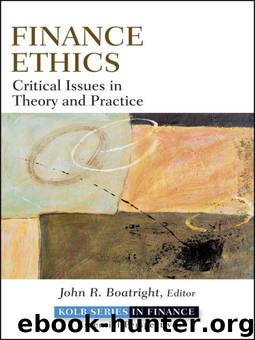Finance Ethics by Boatright John R

Author:Boatright, John R. [Boatright, John R.]
Language: eng
Format: mobi
Publisher: John Wiley & Sons, Inc.
Published: 2010-08-09T07:00:00+00:00
WHAT IS A PROFESSION?
It is helpful to begin by taking a closer look at what counts as a profession and what distinguishes professionals from other practitioners.2
Solomon Huebner, an educator who worked diligently to establish the financial services industry as a profession, states that a profession emerges when a group of practitioners possesses four characteristics. The first is that professions engage in a vocation that is useful and noble. Professional activities contribute value to society through providing a needed service. For example, doctors provide for the health and comfort of our bodies, and accountants allow for the free market of shares by validating the financial reports and the overall health of corporations. In general, the financial services industry is useful to society because its practitioners help people manage their financial risk and provide for their financial future.
It is instructive to consider Huebner’s use of the term vocation. According to Lawrence Blum, the concept of a vocation includes a specific place and a designated purpose within society. Vocation carries with it certain values, standards, and ideals. “Vocation implies that the ideals that it embodies are ones that speak specifically to the individual in question. There is a personal identification with the vocation, with its values and ideals and a sense of personal engagement that helps to sustain the individual in her carrying out the activities of the vocation” (Blum 1994, 104). Huebner’s use of the term vocation points to his belief that an attachment to a vocation results in a personal transformation. For Huebner, it is impossible to become a professional without adopting these professional values. Blum affirms Huebner’s insistence on professional values by saying, “An individual with a vocation must believe deeply the values and ideals of the vocation and must in some way choose or at least affirm them for herself” (Blum 1994, 104).
The second characteristic is that the professions require the possession of expert knowledge. To possess expert knowledge is to understand both the universal principle and the concrete particular and, more important, how to apply correctly the universal principle in specific situations. For example, a professional not only understands that he has a moral obligation to act in the best interest of the client but also understands which course of action promotes the best interest of the client in this particular situation. The professional needs to be competent, and so it is a responsibility of the true professional to stay abreast of the latest developments, not only learning latest practices but also understanding why they are beneficial.
The third characteristic of Huebner’s definition is that to be a professional means to “abandon the strictly selfish commercial view and ever keep in mind the advantage of the client in the application of that knowledge.” The strictly commercial view, according to Huebner, is defined as pursuing one’s self-interest to the exclusion of everyone else. The strictly commercial view, then, is extreme in that it promotes unfettered selfishness.
In the English language, the words self-interest and selfishness have very different meanings. It is important and natural for people to look out for their own interests.
Download
This site does not store any files on its server. We only index and link to content provided by other sites. Please contact the content providers to delete copyright contents if any and email us, we'll remove relevant links or contents immediately.
| Ethics | Etiquette |
| Fashion & Image | Health & Stress |
| Motivation & Self-Improvement | Work Life Balance |
| Workplace Culture |
Tools of Titans by Timothy Ferriss(8393)
Change Your Questions, Change Your Life by Marilee Adams(7780)
Deep Work by Cal Newport(7082)
Playing to Win_ How Strategy Really Works by A.G. Lafley & Roger L. Martin(6300)
Man-made Catastrophes and Risk Information Concealment by Dmitry Chernov & Didier Sornette(6019)
Big Magic: Creative Living Beyond Fear by Elizabeth Gilbert(5771)
Digital Minimalism by Cal Newport;(5764)
Ego Is the Enemy by Ryan Holiday(5445)
The Slight Edge by Jeff Olson(5417)
The Motivation Myth by Jeff Haden(5212)
The Laws of Human Nature by Robert Greene(5208)
Stone's Rules by Roger Stone(5087)
Tuesdays with Morrie by Mitch Albom(4783)
Eat That Frog! by Brian Tracy(4535)
Rising Strong by Brene Brown(4459)
Skin in the Game by Nassim Nicholas Taleb(4248)
The Money Culture by Michael Lewis(4207)
Bullshit Jobs by David Graeber(4190)
Skin in the Game: Hidden Asymmetries in Daily Life by Nassim Nicholas Taleb(4004)
